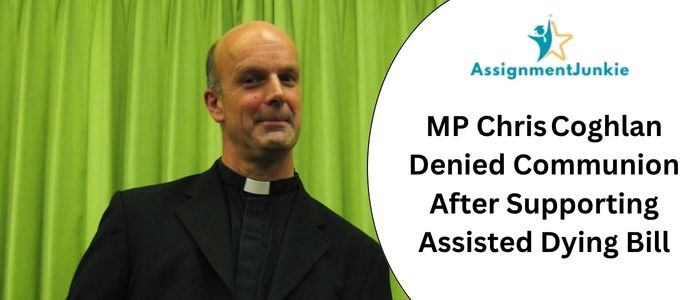
Conscience versus Communion
When the House of Commons voted on 20 June 2025 to legalise assisted dying by a margin of 23, Liberal Democrat MP Chris Coghlan believed he was fulfilling his duty to represent the diverse consciences of Dorking and Horley. Yet two days later, his constituency priest, Father Ian Vane of St Joseph’s Catholic Church in Surrey, told parishioners at back‑to‑back Sunday Masses that Coghlan would henceforth be refused the Eucharist. The unprecedented public rebuke has ignited debate about where pastoral guidance ends and political coercion begins.
A Private Warning Becomes a Public Sanction
Well before the vote, Father Vane emailed Coghlan to caution that supporting the bill would constitute “obstinately persevering in grave sin”. As custodians of the sacraments, the priest wrote, clergy are obliged to protect their integrity—even by withholding communion. Coghlan, reflecting in The Observer, said the message carried unspoken leverage: Vane signs the certificates that allow Coghlan’s children to attend local Catholic schools. Undeterred, the MP voted “aye” and braced for the fallout.
From Altar to Constituency
At the 8 a.m. Mass on 22 June, Vane announced that Coghlan was barred from receiving communion. He repeated the statement at the fuller 10 a.m. service of roughly 150 congregants. Although the MP was not present, word spread swiftly. Some parishioners later contacted Coghlan to express dismay that a sacred rite had been wielded, in their view, as a political cudgel. “It is completely inappropriate,” the MP told reporters. “Religious institutions undermine their legitimacy when they try to coerce Members of Parliament.”
Political Pressure from the Pulpit
Lead author of the legislation, Labour’s Kim Leadbeater, called Coghlan’s stance “brave and principled,” stressing that while faith leaders are free to lobby MPs, public sacramental sanctions cross a red line. Colleagues from other parties quietly shared similar stories of pre‑vote pressure from their own clerics. The affair is not isolated: in 2021 the Vatican cautioned U.S. bishops against denying communion to pro‑choice politicians, warning that the Eucharist should never become a “political weapon”.
The Catholic Hierarchy Responds
The Diocese of Arundel and Brighton, overseen by Bishop Richard Moth, acknowledged the controversy in a measured statement. It reaffirmed Catholic teaching on the sanctity of life, noted that clergy and laity were encouraged only to write privately to MPs, and revealed that Bishop Moth has invited Coghlan to meet face‑to‑face. “Our prayers remain with all those impacted by the bill,” the diocese said, adding that the House of Lords will now scrutinise the legislation in detail.
Wider Faith Opposition
Catholic resistance is part of a broader inter‑faith coalition. Former Archbishop of Canterbury Justin Welby publicly decried assisted dying during his tenure, warning it would redefine society’s duty to the vulnerable. Chief Rabbi Ephraim Mirvis echoed those concerns. Last year Cardinal Vincent Nichols, Archbishop of Westminster, circulated a pastoral letter urging parishioners to lobby against the bill. Yet many practising Christians—including some priests—believe the law can coexist with Church teaching on compassion. Father Vane’s hard‑line approach is therefore notable even within Catholic circles.
Who Decides Worthiness?
Canon 915 of the Church’s Code of Canon Law permits withholding communion from those who “obstinately persist in manifest grave sin.” Traditionally this has applied to notorious public figures, but its interpretation varies. Some bishops prefer private dialogue over public denial; others argue the faithful have a right to clarity when a politician’s actions contradict core doctrine. The Coghlan case starkly illustrates how local pastoral discretion, exercised without wider episcopal guidance, can thrust a single parish into national headlines.
The MP’s Perspective
Coghlan, a lifelong Catholic and former charity founder, insists his vote flowed from personal faith informed by the primacy of conscience—an authority the Second Vatican Council called “the most secret core and sanctuary of a man.” He emphasises that the legislation imposes stringent safeguards: terminal diagnosis confirmed by two doctors, a waiting period, and judicial oversight. For him, empowering patients to avoid unbearable suffering is an act of mercy consistent with Gospel compassion, not a repudiation of life’s dignity.
Communion, Community, and the Common Good
Catholic social teaching holds that political leaders must form consciences, consult constituents, and legislate for the common good. Tensions explode when that discernment collides with episcopal or parochial expectations. In liberal democracies, the resulting dispute is less about theology and more about democratic legitimacy: should sacramental life be conditioned on parliamentary votes? Most theologians argue that the Eucharist, as “medicine for sinners,” should not be weaponised—especially when doctrinal nuances and pastoral complexities are at stake.
What Happens Next?
Bishop Moth’s proposed meeting could mark the first step toward reconciliation. It may also prompt the Catholic Bishops’ Conference of England and Wales to issue clearer national guidelines on communion for politicians, echoing the Vatican’s 2021 concerns. In Parliament, the bill advances to the Lords, where peers will examine amendments on palliative‑care funding, mental‑capacity assessments, and conscience protections for medical staff. Whatever the legislative outcome, the Dorking incident has already deepened the public conversation on how faith traditions engage, persuade, and sometimes collide with democratic lawmaking.
A Teachable Moment
For clergy, the takeaway may be to seek respectful dialogue rather than public sanction. For politicians of faith, the episode underscores the cost of following conscience when it conflicts with institutional teaching. And for lay Catholics, it raises profound questions about the Eucharist’s role in communal life: is it a reward for moral alignment or a source of grace for those still wrestling with complex ethical choices? Chris Coghlan’s communion ban has not ended the debate; it has only made it impossible to ignore.
Achieve Academic Success with Expert Assignment Help in the UK – Assignment Junkie
Looking for reliable assignment help in the UK? Assignment Junkie offers expert academic writing services designed to meet the unique needs of every student. From essays and reports to dissertations and case studies, our team of qualified writers delivers high-quality, plagiarism-free content on time, every time. We focus on precision, originality, and confidentiality to ensure your academic success. Whether you're under pressure from deadlines or struggling with complex topics, our assignment help is here to support you. Choose Assignment Junkie for trusted, affordable, and results-driven assistance.
Source


